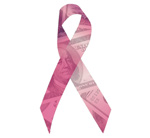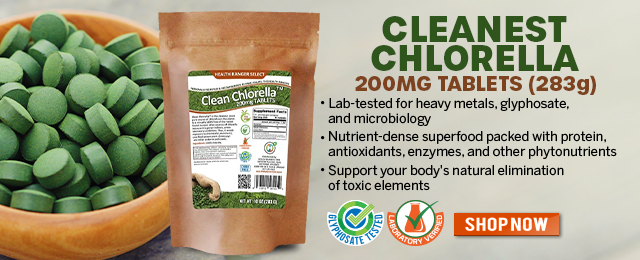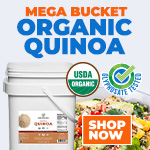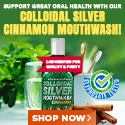
Pink products are little more than clever advertising for breast cancer, health author says
Thursday, October 12, 2006 by: Jessica Fraser
Tags: breast cancer, cancer industry, disease mongering
- European Court of Justice: Healthcare professionals who promoted or administered COVID-19 vaccines are CRIMINALLY LIABLE for any harm caused
- Newly released JFK files reveal Pentagon's role in creating Lyme disease and covid in the same lab
- Aerosolized bioweapons? Strange “diploid biomasses” falling out of the sky in Florida captured under the microscope
- Cinnamon plays a critical role in diabetes management
- Postcard from 1875 highlights smallpox vaccine’s failure: Lessons for today’s COVID-19 response
- When antibiotics are unavailable, natural ANTIMICROBIAL compounds become essential first line defenses against infection
- Oncologist warns of ‘terrifyingly aggressive’ cancers in children, linked to immune suppression from COVID vaccines
- German researchers find link between mRNA vaccines and GENETIC CHANGES that precede CANCER and AUTOIMMUNE DISORDERS
- Exclusive: Microscopic analysis suggests unknown biological contaminants falling from the sky
- AI-powered forecasting model proves more accurate than traditional systems at predicting the weather
- Scientists unveil breakthrough method to eliminate "Forever Chemicals" from water, transforming waste into graphene
- Nature's cold-fighting arsenal: Immune-boosting foods and healing recipes you need now
- DEATH by 12 VACCINES SIMULTANEOUSLY: Doctor playing catch-up on jabs injects 1-year-old baby with massive combination of dirty vax cocktails
- EPA reconsiders Obama's CO2 “Endangerment Finding” - could unleash American energy freedom
- Israeli forces execute Gaza medics, bury them in mass grave in Rafah
- Britain’s descent into police state censorship: Parents raided for questioning their daughter’s school system online
- “Bankrupt Tesla” movement EXPOSED: Left-wing extremists, Biden-linked operatives target Elon Musk in coordinated attack
- FBI imposed gag order on agents to silence Hunter Biden laptop truth before 2020 election, new chat logs reveal
- Newly released JFK files reveal Pentagon's role in creating Lyme disease and covid in the same lab
- Kiss Your Genetic Privacy Good-Bye! 23andMe Gets Green Light to Sell Your Intimate Genetic Details to Anyone They Want
- Oncologist warns of ‘terrifyingly aggressive’ cancers in children, linked to immune suppression from COVID vaccines
- Analysis: The coming economic collapse, a mass uprising and Trump's three secret weapons to halt the growing revolt
- European Court of Justice: Healthcare professionals who promoted or administered COVID-19 vaccines are CRIMINALLY LIABLE for any harm caused
- Dr. Suzanne Humphries makes bombshell appearance on Joe Rogan podcast, exposing vaccine industry deception back to POLIOMYELITIS
- Woman contracts WORLD'S DEADLIEST VIRUS after unknowingly being given the WRONG VACCINE
- NIH study, buried for decades, reveals that Flu Shots INCREASE elderly deaths, not prevent them
- Sugar-free deception: Artificial sweeteners hijack hunger signals, fuel obesity epidemic, study warns
- CDC finally halts $11 billion COVID funding scam as health officials admit the ‘pandemic’ was a fraud
- AI weather model outperforms traditional forecasts, boosts accuracy by 20%
- Black cumin seed oil emerges as a powerful ally against breast cancer and chronic inflammation
- Musk targets “strangely wealthy” lawmakers in DOGE probe, names Pelosi, McConnell, Schumer
- COVID-19 scandal linked to CANCER SURGE: Billionaire researcher sounds alarm
- “Independent” anti-Russia outlet MEDUZA faces COLLAPSE as US funding dries up
- The Health Ranger releases “Vaccine Zombie” song and music video, using AI-animated zombies for the music video
- DARPA: The shadowy innovator behind the world’s most advanced military technologies
- Britain’s descent into police state censorship: Parents raided for questioning their daughter’s school system online
- Newly released JFK files reveal Pentagon's role in creating Lyme disease and covid in the same lab
- California's social media censorship law struck down: A victory for free speech or a threat to online safety?
- EPA advisor admits the agency is funneling billions to climate groups ahead of Trump’s return to White House
- The Health Ranger releases “Vaccine Zombie” song and music video, using AI-animated zombies for the music video
- Dr. Mike Yeadon releases 15-minute testimony - WATCH - about genocidal intent of COVID “vaccines”
- Florida takes a stand: DeSantis proposes permanent ban on mRNA vaccine mandates
- Mike Adams releases country western hit single: Goin’ Back in Time is Comin’ Home
- Rep. Nancy Mace introduces bill to ban biological males from female facilities on federal property
- Unpacking the Lies That We’ve Been Fed – new song and music video released by Mike Adams, the Health Ranger
- “Why we influenced the 2020 elections”: Facebook files reveal the coordinated effort to bury the Hunter Biden laptop story
- House Intelligence Committee calls for the ARREST and PROSECUTION of Dr. Anthony Fauci
- Sugarcane extract superior to cholesterol-lowering drugs?
- The pandemic as a tool for INDOCTRINATION: Understanding “The Indoctrinated Brain” by Dr. Michael Nehls
- Survival 101: Effective EMF blocking techniques
- Mike Adams releases music poetry sensation: A Child of God
- Peter Rost exposes Big Pharma corruption in his book “The Whistleblower: Confessions of a Healthcare Hitman”
- Migrants are taking advantage of recent hurricanes to scam residents and loot their homes
- Michigan sheriff announces criminal investigation into 2020 election crimes, Dominion Voting Systems
- Red Cross issues warning to stop blood plasma donations from vaccinated people
- Scientists confirm: GENIUS brain function can be spontaneously unleashed in humans without any apparent cause
- EPA advisor admits the agency is funneling billions to climate groups ahead of Trump’s return to White House
- HYSSOP: What research reveals about the health benefits of this ancient holy herb
- Two containers with completed ballots fall out of truck in Florida
- Fully vaccinated about to see “tsunami” of illness and death, warns virologist
- Global leaders unite to clamp down on “misinformation” with UN-backed Cascais Declaration
- BREAKING: 2025 NDAA authorizes mandatory military draft of WOMEN across America… as Pentagon pursues global NUCLEAR war with both Russia and China at the same time
- Michael Yon warns of a ZIONIST TAKEOVER in Trump’s second administration
- Ozempic and Wegovy weight loss drugs are injectable LIZARD VENOM PEPTIDES that may unleash a devastating wave of organ failure… side effects align with symptoms of SNAKE BITES
- BOMBSHELL: DNA testing kits are a SCAM to develop ethnic-specific bioweapons
- Israeli soldiers accused of even more torture and abuse in the West Bank
- These 13 countries just signed an agreement to engineer a global FAMINE by destroying food supply
- NASA admits that climate change occurs because of changes in Earth’s solar orbit, and NOT because of SUVs and fossil fuels
- Newly released JFK files reveal Pentagon's role in creating Lyme disease and covid in the same lab
- RFK Jr. clears key hurdle: Sen. Susan Collins backs controversial HHS nominee, signaling a new era for health policy
- Sermon 30: How Jesus reveals Caesar’s FAKE CURRENCY and FALSE AUTHORITY
- Coriander seeds: Ancient medicine backed by modern science
"You can cook for the cure, shop for the cure -- why don't we have the cure yet?" asked Barbara Brenner, executive director of Breast Cancer Action, a San Francisco-based advocacy group.
While some companies make sizeable donations for every "pink" purchase -- such as Clinique, which donates $10 of every $14 "In the Pink" lipstick sale to the Breast Cancer Research Foundation -- other companies only donate a couple cents per dollar or transaction.
Breast Cancer Action is running a "Think Before You Pink" campaign asking consumers to question breast cancer charities and their corporate partners before spending money on pink products. A 2002 ad the group ran in the New York Times pointed out that Eureka donated less than 1 percent from the sale of its "Clean for the Cure" vacuum, while American Express donated only a penny per transaction of any amount during its "Charge for the Cure" campaign.
"It's rarely more than a penny on the dollar," said Trent Stamp, executive director of Charity Navigator, a charity watchdog group. "It's just great advertising."
Consumer advocate Mike Adams, a vocal critic of mainstream cancer treatments, said companies selling pink products are not held accountable for their promised donations, and consumers are largely unaware of how much of their purchase is actually donated.
"For most pink products, only a tiny percentage of the product price is donated to cancer research," Adams said. "Buying a pink can of soup, for example, may result in two cents being donated."
Daniel Borochoff of the American Institute of Philanthropy, says companies often use meaningless phrases such as "net profits to charity" or "a portion of proceeds go to charity," to help sell pink products. In reality, "pink" donation promises may only last for an unspecified limited time, or a certain sales target must be reached before donations are triggered, Borochoff said.
"There's no accountability on where the money goes or how it is used," Adams said. "Where are the anti-cancer education programs that teach women nutrition?"
Brenner says consumers must "engage in meaningful activity" to solve the problem of breast cancer. "If you think you're going to solve the problem by buying Yoplait, you've got another thing coming."
###
Breast cancer at FETCH.news
Get independent news alerts on natural cures, food lab tests, cannabis medicine, science, robotics, drones, privacy and more.
Take Action: Support Natural News by linking to this article from your website
Permalink to this article:
Embed article link: (copy HTML code below):
Reprinting this article:
Non-commercial use OK, cite NaturalNews.com with clickable link.
Follow Natural News on Facebook, Twitter, Google Plus, and Pinterest
Science News & Studies
Medicine News and Information
Food News & Studies
Health News & Studies
Herbs News & Information
Pollution News & Studies
Cancer News & Studies
Climate News & Studies
Survival News & Information
Gear News & Information
News covering technology, stocks, hackers, and more



"Big Tech and mainstream media are constantly trying to silence the independent voices that dare to bring you the truth about toxic food ingredients, dangerous medications and the failed, fraudulent science of the profit-driven medical establishment.
Email is one of the best ways to make sure you stay informed, without the censorship of the tech giants (Google, Apple, Facebook, Twitter, YouTube, etc.). Stay informed and you'll even likely learn information that may help save your own life."
–The Health Ranger, Mike Adams













































